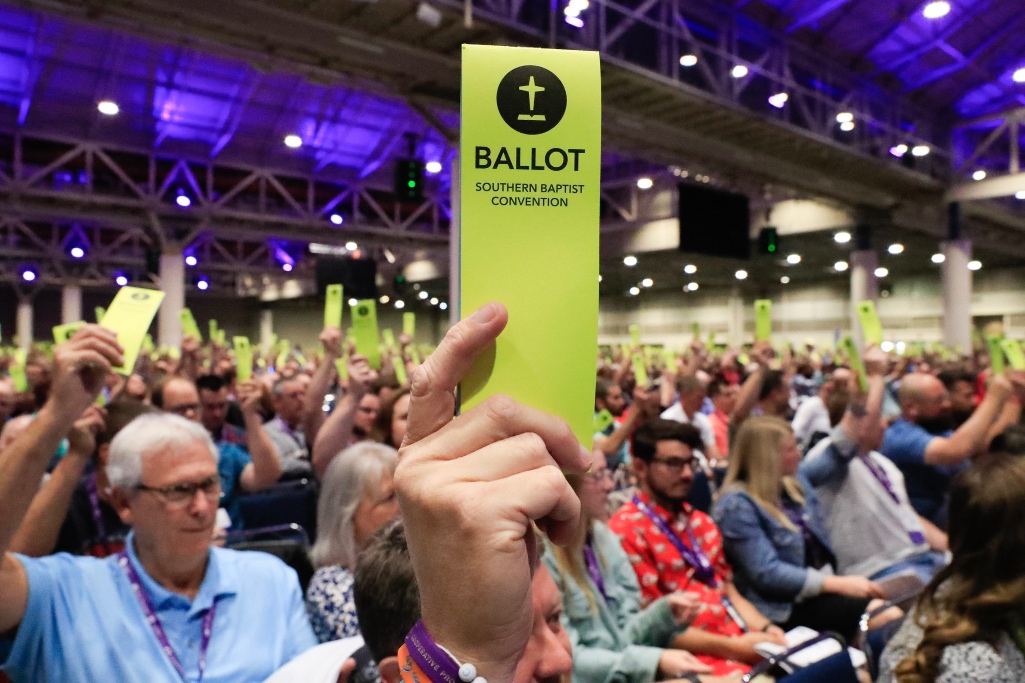
Messengers vote during the 2023 SBC Annual Meeting in New Orleans.
Last month, messengers to the Southern Baptist Convention Annual Meeting in New Orleans affirmed their belief that the pastorate is reserved for men with two decisions – one to amend the SBC’s constitution to reflect that belief and another to deem two churches outside the bounds of friendly cooperation due to their employing women pastors.
One of those churches was Saddleback Church in Lake Forest, Calif., one of the SBC’s largest. Saddleback founder and evangelical superstar Rick Warren has accused many Southern Baptists of wanting to take the SBC “back to the 1950s.”
Warren is not alone in his opposition to the SBC’s decision. The issues of complementarianism – the belief that men and women are equal before God but have different, complementary roles in the church and home – have been hotly contested within evangelical circles since the 1970s.
While I disagree with Warren, I understand the sentiment that it can feel the SBC is dismissing female pastors out of prejudice. I think the primary reason women choose to pursue pastoral ministry is because, well, they want to do ministry. Rev. Tish Warren (no relation to Rick) of the Anglican Church of North American (ACNA) has written, “I Got Ordained So I Can Talk About Jesus. Not the Female Pastor Debate.”
I too love Jesus and from my earliest memories have wanted to talk about him to just about everybody. After all, some of the most faithful Southern Baptist evangelists have been women.
While I believe the SBC rightly reaffirmed the historic Christian doctrine that God intends for men alone to hold the authoritative office of elder/pastor, member churches must be careful not to glibly brush off women who want to talk about Jesus.
The key to maintaining a robust, compassionate complementarianism is investing more in women, not less. In the wake of this vote, pastors should carefully consider more ways they can empower women for biblical ministry.
Since the early church, women have been a powerful force. Every person to walk the earth since Adam and Eve has had a mother. And women tend to have a profound impact on the spiritual formation of children. (Consider Timothy’s grandmother Lois or Augustine’s mother Monica.)
But, if our churches are not places where women feel encouraged to serve, they are likely to feel discouraged and stifled.
A passionate, gifted, frustrated woman is likely to be tempted toward one of two things: to water down her theology to make room for a female pastorate or to give up, burn out, and run away.
Both outcomes are to the detriment of our congregations.
In my early 20s my husband and I joined Hope Fellowship Church in Cambridge, Massachusetts. At that time, Pastor Curtis Cook asked a small group of women, including me, to meet with him over several weeks to equip us to lead small group bible studies for other women. After finishing the training, I promptly started a small group. This investment encouraged me in the things I most deeply wanted to do and trained me to do them well.
In many of our churches, the opportunities for women to teach are slim.
But should that be the case? After all, women are qualified to teach more than 50 percent of the human population. Shouldn’t there be more appropriate venues to do so?
Instead of asserting that gifting doesn’t equal calling (and leaving it there), church leaders should consider if there’s a way that gifting could be rightly used. Women training women for the purpose of godliness has always been highly effective – and commanded (Titus 2).
Pastor, if you want to equip your church, don’t overlook the women. Consider them carefully; look at their character and their reputation, particularly among other women. Do they desire to teach? Do they have a gentle and quiet spirit? Are they teachable and humble?
Identify those women, take them seriously, and equip them. My pastors at Del Ray Baptist Church in Alexandria, Virginia, have poured hours into giving me honest, hard feedback on my writing and teaching. My church has paid for me to attend intensive expositional training and has loaned me dozens of theological texts. They provide childcare for our midweek bible study, demonstrating that they care about moms being able to study the Word together. And they pray for us by name. Doing these things demonstrates that women and their ministry opportunities aren’t a backburner issue.
Like Tish Warren, I want to talk about Jesus. But I disagree with her conclusion that to do so I need to be a pastor. My plate and my cup are overflowing with ministry opportunities. But those opportunities don’t just happen – others invested in me so that I could do the work of ministry.
(EDITOR’S NOTE – Kira Nelson is a wife, a homeschooling mom to three young children, a student at Southern Baptist Theological Seminary and host of the Delighted Motherhood podcast. She is a member of Del Ray Baptist Church, where she leads a women’s Bible study and serves on the women’s advisory board.)


